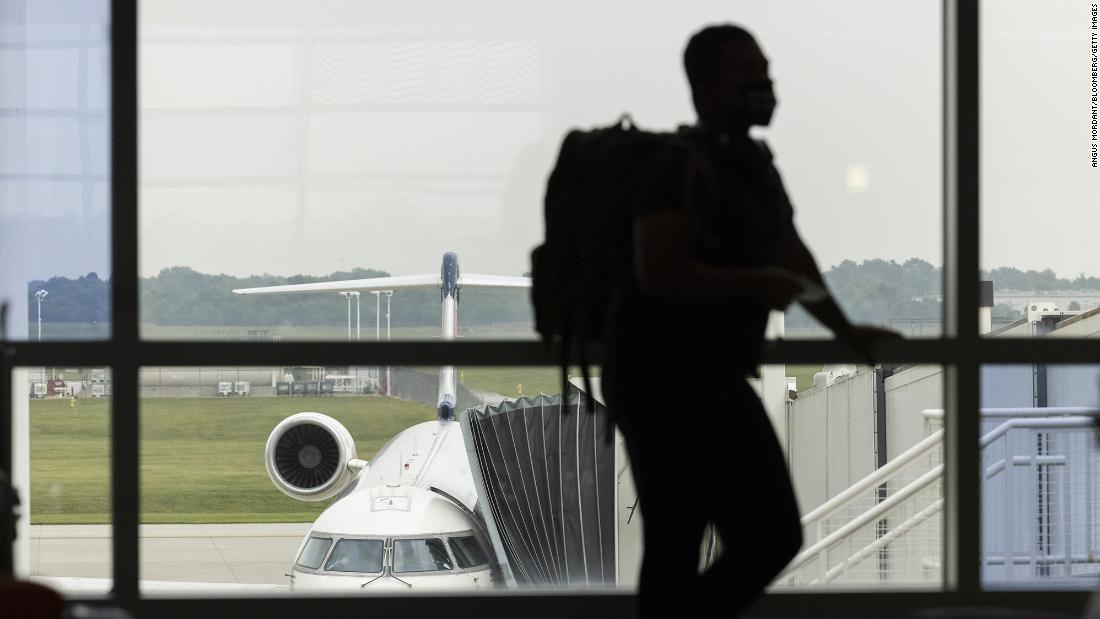US added just 235,000 jobs in August 0:51
Editor's Note:
Mark Zandi is Chief Economist at Moody's Analytics.
The opinions expressed in this comment are yours.
(CNN) -
It's been 18 difficult months since the pandemic first struck, and it looks like it will take another 18 months for the economy to be free and free from the impact of covid-19.
When covid-19 vaccines became widely available this spring, there was widespread optimism that the pandemic would quickly stop and the economy would rebound in full force.
There was no such luck.
The highly contagious delta variant of the virus, which is causing a severe wave of infections and hospitalizations, is causing substantial damage to the economic recovery.
This was made clear in the August employment report from the Bureau of Labor Statistics.
After adding about a million jobs in both June and July, companies added less than a quarter of a million jobs last month.
That's not bad in typical times, but it's not good when the economy is still down by more than 5 million jobs since before the pandemic.
The dramatic drop in job growth was driven by companies that closed or lost sales due to the virus.
Almost half a million more people were unable to work last month because the pandemic forced their employers to reduce their activity.
The biggest impact was restaurants and bars, which had added nearly 300,000 jobs in July but were then forced to cut payrolls in August.
Hotels added workers, though not as much, and recreational activities, which include everything from baseball games to Broadway, were pulled from the additional jobs of previous months.
advertising
Study shows what could make the delta variant of the new coronavirus more contagious
How does the delta variant affect children?
1:42
Difficulties that the delta variant brings to jobs
The delta variant has also caused many companies to delay in requiring workers to return to their offices, which also hinders economic recovery. Not long ago, many companies were targeting this post-Labor Day return, but now it seems more likely that 2022 will begin. This is a blow to retailers and the service industry that cater to office workers, and thus So it's not surprising that transit-related jobs fell last month. Airlines continue to bring in workers, but they won't be able to do so for much longer if air travel continues to decline as they have in recent weeks. Nervous travelers are suddenly getting more cautious and governments are re-imposing travel restrictions.
The delta variant is further hurting global supply chains, disrupting home builders, who are grappling with shortages of everything from wood to appliances. Demand for homes is booming, but builders can't build houses faster for lack of materials. Jobs in vehicle manufacturing and dealerships are stagnant as the industry cannot source the semiconductors it needs to make cars and trucks. Vehicle sales have fallen, but not because people don't want to buy. They want. But because there are so few cars to buy that vehicle prices have turned parabolic.
Global supply chain problems have caused the prices of many products to skyrocket, and although this will not persist, the delta variant ensures that higher prices will consume our purchasing power and spend it longer, costing us jobs. of work.
Just a few weeks ago, China closed a key terminal in a major port after the delta variant infected a dock worker.
The cost of shipping a container on different east-west routes, which at this time of year will be filled with Christmas items, is 360% more than a year ago.
These are the most difficult jobs for large chains to fill
Biden: 943,000 new jobs created during July 1:27
The resurgence of the pandemic and the impact on jobs
Record jobs are also less likely to fill quickly given the resurgence of the pandemic. Many of the millions of potential workers who have remained on the sidelines of the job market may delay their return because they are sick, fear contracting COVID-19 or need to care for family and friends who have it. The timing of the delta variant is especially bad, just as schools start to open with in-person learning. Many parents who weren't working since the pandemic hit, because they were stuck at home with their children learning online, were already eager to get back to work. Now it is even more difficult.
However, while the delta variant weighs on the economic recovery, the odds are still good that it will not short-circuit you.
It is encouraging that vaccination rates have increased, particularly in places where there has been a lot of reluctance to get vaccinated;
the delta variant has rightly scared people who avoided getting vaccinated.
Skillful policy formulation would be helpful.
The Federal Reserve has signaled that it will begin to reduce its buying of long-term bonds, or quantitative easing, before the end of the year.
However, if the delta variant continues to intensify and the employment figures for September are as weak as those for August, the Fed should delay this measure.
The pandemic must cease to be an economic threat before the Fed takes its foot off the monetary accelerator.
Additionally, lawmakers must soon pass some version of
President Biden's
Build Back Better
Agenda
. This includes more spending on public infrastructure and support for a variety of social programs. While this would not help the economy for a year or so, the plan is largely about boosting the economy's long-term growth, it would go a long way toward ensuring the economy fully recovers from the pandemic of timely manner.
The August employment report shows how closely linked the fortunes of the economy are to COVID-19.
As long as the pandemic continues, it will not be a straight line for economic recovery, it will ebb and flow with the waves of the pandemic.
But if each new wave is less disruptive than the last and the pandemic continues to decline, which still seems reasonable, the economy will return to full employment in early 2023.
Covid-19 Delta variant








